What ideas or presuppositions are conveyed by the title?
Chapter 1 The Unities of Discourse
What historical assumptions does Foucault believe we should avoid, at least at the onset of any investigation? (assumption of categories, unity of a work, tradition, origins, causation, influence, unity of a book or of a work or collected works, intention of author or the author's mind, development and evolution, action of spirit or semiotic field of age, disciplinary fields)
If one removes all such assumptions, what remains? (discursive field/formations, descriptions of a discursive event, 6) Why is this not an arbitrary category? (the field of discursive events is a finite grouping) Under what conditions can we consider the aforementioned categories? (must examine their laws, under what circumstances they can come into existence, relationship to other statements, what makes it distinct, intertextuality, 7)
What are the advantages of this method? (will enable one to form new categories)
Do any of these "conditions" resemble the prior categories of "influence," action of semiotic field, evolution, tradition, etc.?
What unities interest him? (medicine, psychology, politics; discourses of "the sciences of man")
Chapter 2: Discursive Formations
What are some wrong ways of forming categories? (to assume that statements referring to the same object are a unity, 9; instead should seek "rules that make possible the appearance of objects during a given period of time," 10). What example does he give of such a topic? (the concept of "madness," 10)
A second wrong way would be to assume that style or manner of statement might unify a category? (gives example of 19th century medicine, which presupposed a set of assumptions, 11) How can one define a discursive formation? (must show how any particular object of discourse finds in it its place and law of emergence, 12; not the objects but a web of relationships is being examined, as seen in "discourse itself as a practice," 13)
How does he apply this in examining medicine? (will show how physician's views are modified by outside information and interpretation, 14, will note changes in methodology) In examining grammar? (not abstract concepts but interplay of forms of speech or concepts will be examined)
What is misguided by the attempt to identify themes? (16, instead one should seek "the dispersion of the points of choice that the discourse leaves free," 16)
What characterizes any attempts to find unities in discourse? (gaps, differences, transformations, divisions; one finds systems of dispersion, 17, i. e. contrasts) What then should be the object of study? (rules of formation within a discursive formation, 17)
Is the writing of history then an exercise in identifying a history of rhetoric (and presumably its real world consequences)?
Chapter 3: The Formation of Objects
Does Foucault follow his own principles in the history of psychopathology he provides in chapter 3? What is important about the themes and topics he considers as "history"?
What forms of categories does he seem especially to dislike? (medical and scientific certainties, belief in progress) What does he instead seek?
--surfaces of emergence, 19 (i. e., in family or work situation)
--authorities of definition and delimitation, 20 (i. e., field of medicine)
--grids of specification, 20 (soul, body, etc.)
All of these are inadequate as meaningful accounts, must seek rules of practice, grids of networks and relationship.
Is his work concerned with the history of persons accused of madness? (no, one seeks instead discourse in its own complexity, 21-22, "the emergence of a group of rules proper to discursive practice"--"practices that systematically form the objects of which they speak," 23)
Is it always possible to isolate a study of the discourse surrounding a grouping of objects from a consideration of the history of the objects themselves?
What kinds of topics/histories might be best served by a Foucauldian approach?
